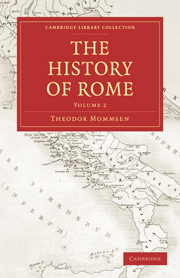Book contents
- Frontmatter
- Contents
- MAP OF ITALY
- BOOK THIRD: FROM THE UNION OF ITALY TO THE SUBJUGATION OF CARTHAGE AND OF THE GREEK STATES
- CHAPTER I CARTHAGE
- CHAPTER II THE WAR BETWEEN ROME AND CARTHAGE CONCERNING SICILY
- CHAPTER III THE EXTENSION OF ITALY TO ITS NATURAL BOUNDARIES
- CHAPTER IV HAMILCAR AND HANNIBAL
- CHAPTER V THE WAR UNDER HANNIBAL TO THE BATTLE OF CANNÆ
- CHAPTER VI THE WAR UNDER HANNIBAL FROM CANNÆ TO ZAMA
- CHAPTER VII THE WEST FROM THE PEACE OF HANNIBAL TO THE CLOSE OF THE THIRD PERIOD
- CHAPTER VIII THE EASTERN NATIONS AND THE SECOND MACEDONIAN WAR
- CHAPTER IX THE WAR WITH ANTIOCHUS OF ASIA
- CHAPTER X THE THIRD MACEDONIAN WAR
- CHAPTER XI THE GOVERNMENT AND THE GOVERNED
- CHAPTER XII THE MANAGEMENT OF LAND AND OF CAPITAL
- CHAPTER XIII FAITH AND MANNERS
- CHAPTER XIV LITERATURE AND ART
- CORRECTIONS
CHAPTER VIII - THE EASTERN NATIONS AND THE SECOND MACEDONIAN WAR
Published online by Cambridge University Press: 05 October 2010
- Frontmatter
- Contents
- MAP OF ITALY
- BOOK THIRD: FROM THE UNION OF ITALY TO THE SUBJUGATION OF CARTHAGE AND OF THE GREEK STATES
- CHAPTER I CARTHAGE
- CHAPTER II THE WAR BETWEEN ROME AND CARTHAGE CONCERNING SICILY
- CHAPTER III THE EXTENSION OF ITALY TO ITS NATURAL BOUNDARIES
- CHAPTER IV HAMILCAR AND HANNIBAL
- CHAPTER V THE WAR UNDER HANNIBAL TO THE BATTLE OF CANNÆ
- CHAPTER VI THE WAR UNDER HANNIBAL FROM CANNÆ TO ZAMA
- CHAPTER VII THE WEST FROM THE PEACE OF HANNIBAL TO THE CLOSE OF THE THIRD PERIOD
- CHAPTER VIII THE EASTERN NATIONS AND THE SECOND MACEDONIAN WAR
- CHAPTER IX THE WAR WITH ANTIOCHUS OF ASIA
- CHAPTER X THE THIRD MACEDONIAN WAR
- CHAPTER XI THE GOVERNMENT AND THE GOVERNED
- CHAPTER XII THE MANAGEMENT OF LAND AND OF CAPITAL
- CHAPTER XIII FAITH AND MANNERS
- CHAPTER XIV LITERATURE AND ART
- CORRECTIONS
Summary
The Hellenic East
The work, which Alexander king of Macedonia had begun a century before the Romans acquired their first footing in the territory which he had called his own, had in the course of time—while adhering substantially to the great fundamental idea of Hellenizing the East—changed and expanded into the construction of a system of Helleno-Asiatic states. The unconquerable propensity of the Greeks for migration and colonizing, which had formerly carried their traders to Massilia and Cyrene, to the Nile and to the Black Sea, now enabled them to retain what the king had won; and under the protection of the sarissœ, Greek civilization peacefully domiciled itself everywhere throughout the ancient empire of the Achæmenidæ. The officers, who divided the heritage of the great commander, gradually settled their differences, and a system of equilibrium was established, the very oscillations of which manifest some sort of regularity.
The great states. Macedonia
Of the three states of the first rank belonging to this system—Macedonia, Asia, and Egypt—Macedonia under Philip the Fifth, who had occupied the throne since 534, was externally at least very much what it had been under Philip the Second the father of Alexander—a military state compact in form, and with its finances in good order. On its northern frontier matters had resumed their former footing, after the waves of the Gallic inundation had rolled away; the guard of the frontier kept the Illyrian barbarians in check without difficulty, at least in ordinary times.
- Type
- Chapter
- Information
- The History of Rome , pp. 214 - 252Publisher: Cambridge University PressPrint publication year: 2010First published in: 1862



